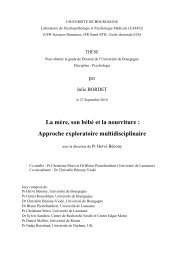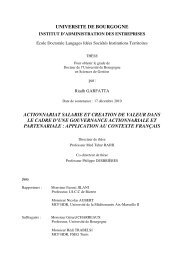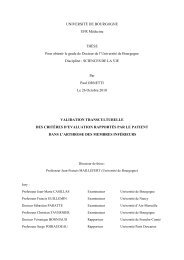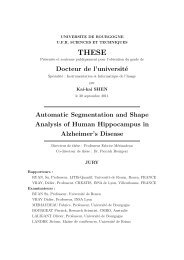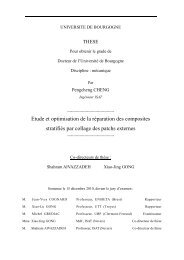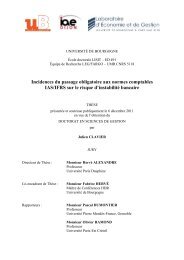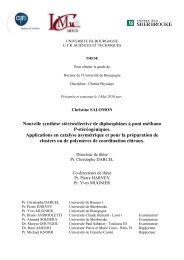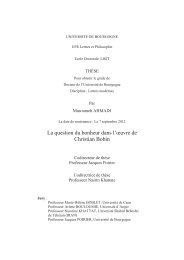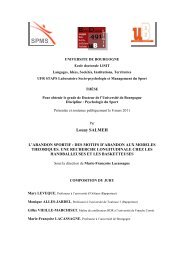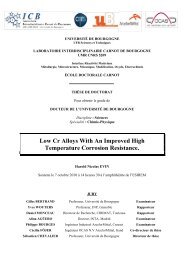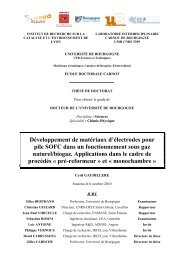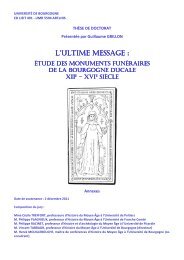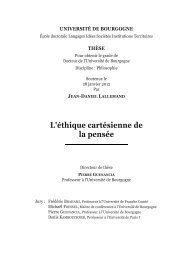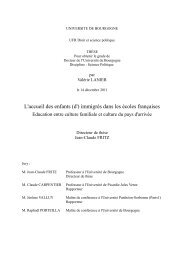UNIVERSITE DE BOURGOGNE THÈSE Yongbo LIU - Université de ...
UNIVERSITE DE BOURGOGNE THÈSE Yongbo LIU - Université de ...
UNIVERSITE DE BOURGOGNE THÈSE Yongbo LIU - Université de ...
Create successful ePaper yourself
Turn your PDF publications into a flip-book with our unique Google optimized e-Paper software.
CHAPTER 1<br />
LITERATURE REVIEW ON THE CONSEQUENCES OF<br />
GENE FLOW FROM OILSEED RAPE TO ITS RELATIVES<br />
Gene flow and introgression between transgenic crops and wild relatives is consi<strong>de</strong>red one of<br />
un<strong>de</strong>sirable co nsequences o f co mmercial r elease o f genetically mo dified ( GM) / t ransgenic<br />
crops c onferring h erbici<strong>de</strong>, i nsect or vi rus-resistance genes. C ommercialized G M cr ops<br />
involving m any i mportant r esources s pecies, s uch a s s oybean, m aize, c otton, oi lseed r ape,<br />
squash, papaya, alfalfa and sugarbeet, are cultivated worldwi<strong>de</strong> (James 2009). Most of these<br />
transgenic species could hybridize with their wild relatives (Ellstrand et al. 1999; Armstrong<br />
et al. 2005).<br />
Hybridization is a p rerequisite f or gene flow, and ge ne f low i s a p rerequisite f or<br />
introgression. B ut, not all h ybridization c ould i nduce gene flow. Hybrids can form w hen<br />
certain conditions are achieved, including sympatry with a compatible relative (weedy, wild<br />
or crop), overlapping flowering phenology, pollen and seed dispersal, successful fertilization<br />
and viable offspring. Successful gene flow does not necessarily result in gene introgression.<br />
The introgression of transgenes into the receiving species or population <strong>de</strong>pends mainly on<br />
the barriers to hybridization and introgression, the evolution and fate of inter-specific hybrids,<br />
their fitness, and the potential costs and benefits of transgenes in the offspring un<strong>de</strong>r variable<br />
habitat conditions.<br />
Inter-specific gene f low v ia h ybridization a nd s ubsequent i ntrogression pl ays a<br />
biologically imp ortant r ole in th e a cquisition o f g enetic a daptations th rough n atural p lant<br />
populations. It has been recognized that introgression can occur frequently and may produce<br />
viable, e ven hi ghly-adapted, pr ogeny ( e.g., A rnold 1997, 2006; R ieseberg e t a l. 1999) ,<br />
although e volutionary s cientists e arly f ocused on t he i mportant r ole of r are e vents of<br />
introgression f or t he evolution of m any pl ant groups (e.g., Lotsy 191 6; A n<strong>de</strong>rson 1949;<br />
Stebbins 1959; Grant 1981).<br />
We present here a literature survey on the processes and consequences of gene flow<br />
and introgression between oilseed rape and its wild relatives. Such a topic has been ignored<br />
before the release of GM varieties, but many studies have documented this issue to date.<br />
16



